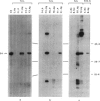Abstract
Using indirect immunofluorescence (IF) with HEp-2 cells as a substrate serially bled SJL mice were found to gradually develop a high titre of anti-nucleolar antibodies (ANuA) after 3-5 weeks of s.c. injections of 1.6 mg HgCl2/kg body weight every third day. The ANuA showed a clumpy nucleolar pattern of localization and were composed of all IgG subclasses, but contained, in comparison with the antinuclear antibodies (ANA) in MRL-lpr/lpr mice, significantly lower titres of IgG2a and only traces of IgG3. Immunoblotting analysis using purified mouse liver nucleoli revealed that the sera with ANuA identified the same 34-kD nucleolar protein which was targeted by a human scleroderma serum containing autoantibodies monospecific for fibrillarin. In addition, a fraction of the mercury-treated SJL mice developed serum antibodies reacting with 10-15 and 60-70 kD nucleolar proteins in immunoblotting. The presence of serum autoantibodies reacting with the 10-15 kD proteins correlated with significantly increased titres of anti-histone antibodies of the IgG class in ELISA. Some mercury-treated SJL mice also developed a significantly increased titre of anti-histone antibodies of the IgM class. B10.S mice treated with mercuric chloride consistently developed ANuA, which also targeted a 34-kD nucleolar protein. Since anti-fibrillarin antibodies are specific markers of scleroderma, the present animal model may be valuable for studies of the immunological aberrations which are likely to induce this autoimmune response.
Full text
PDF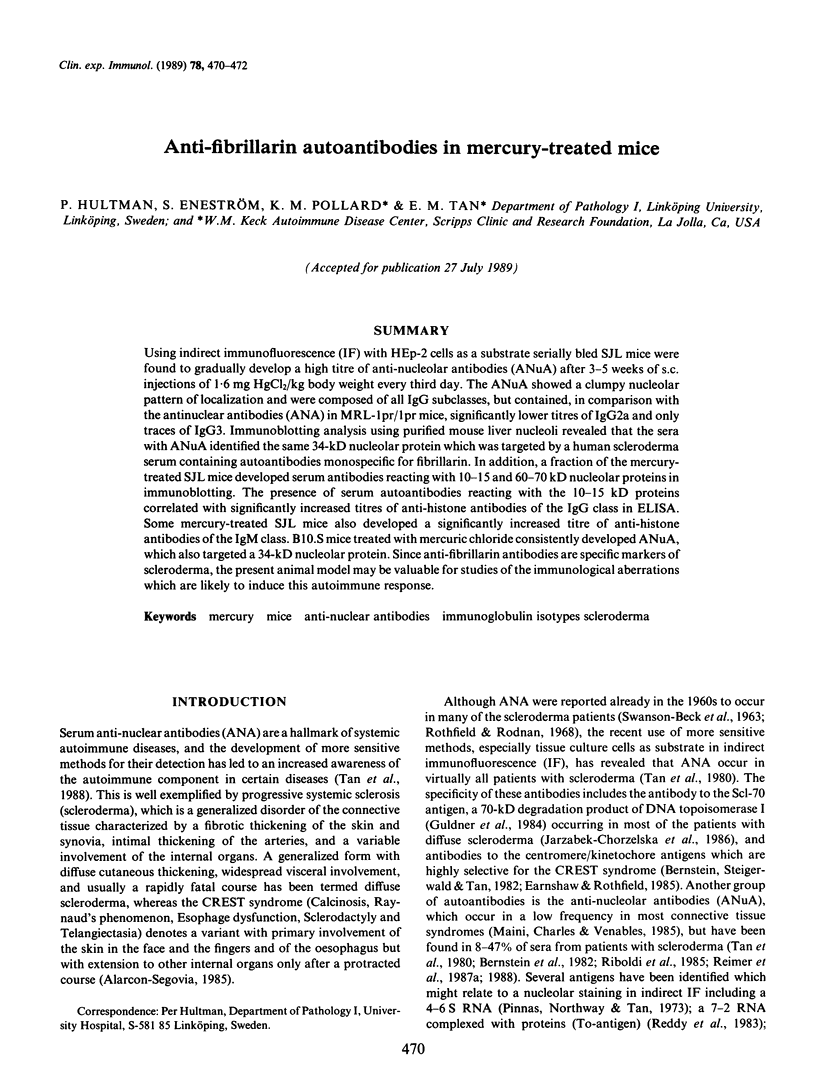
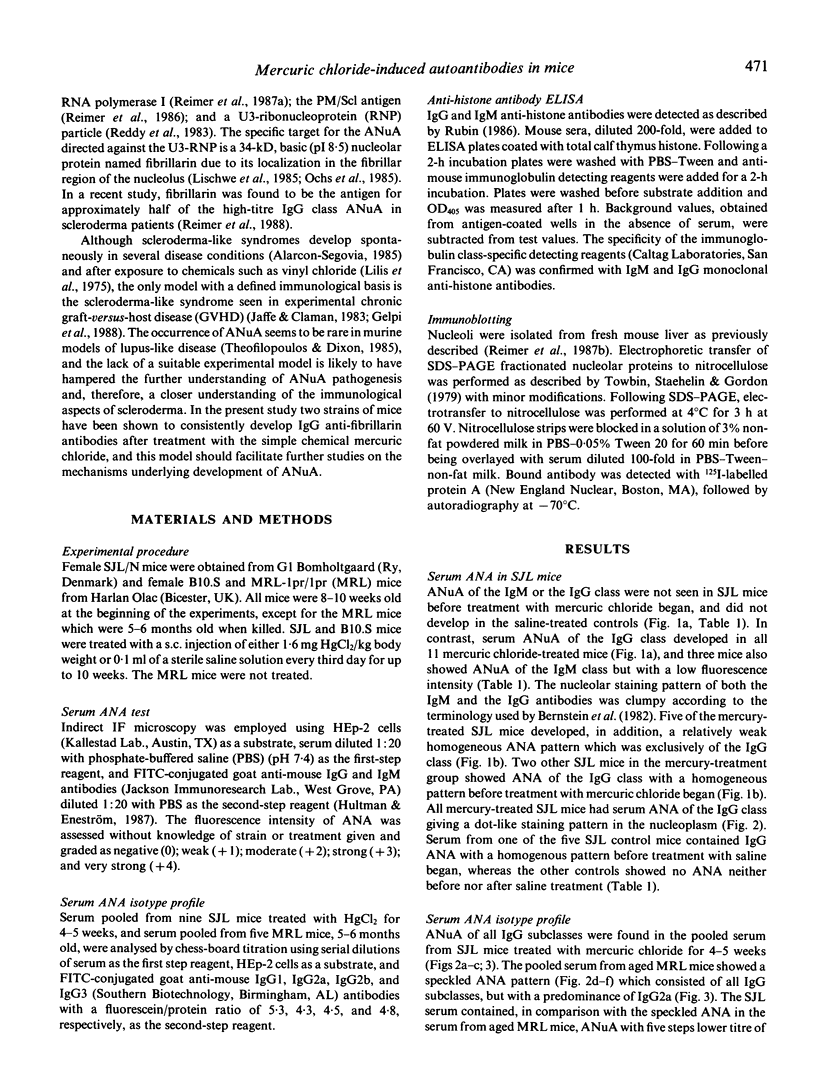
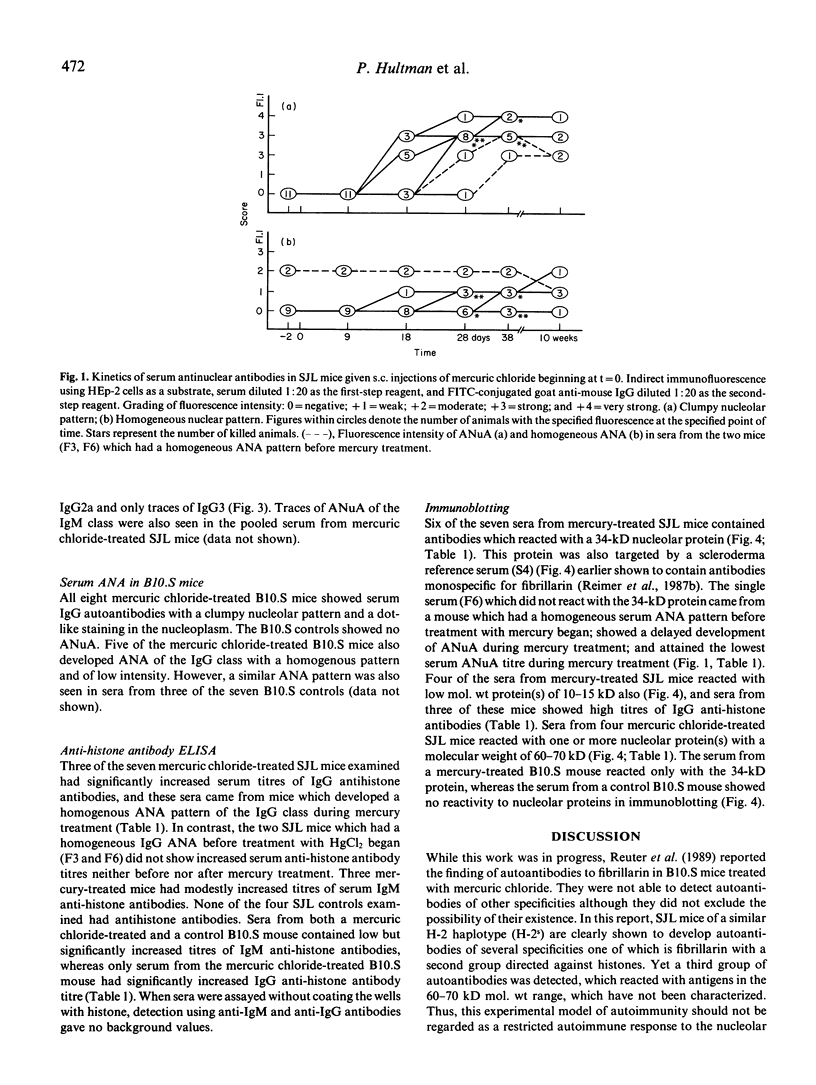
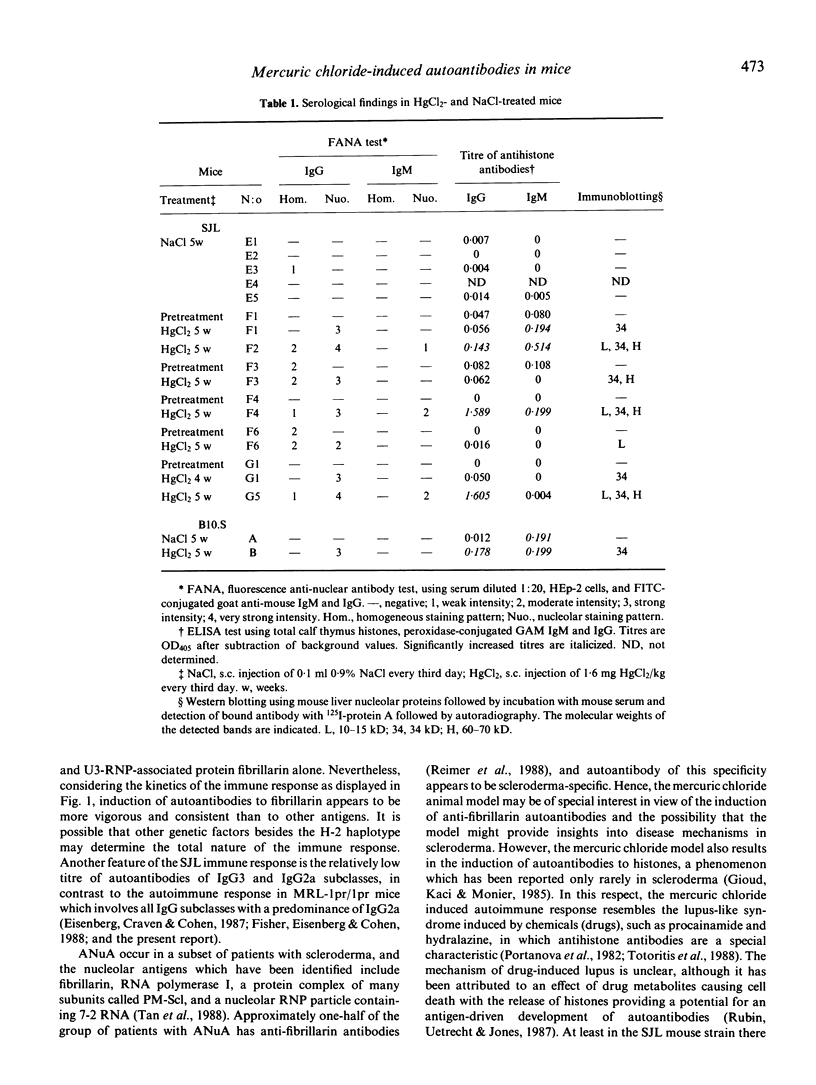
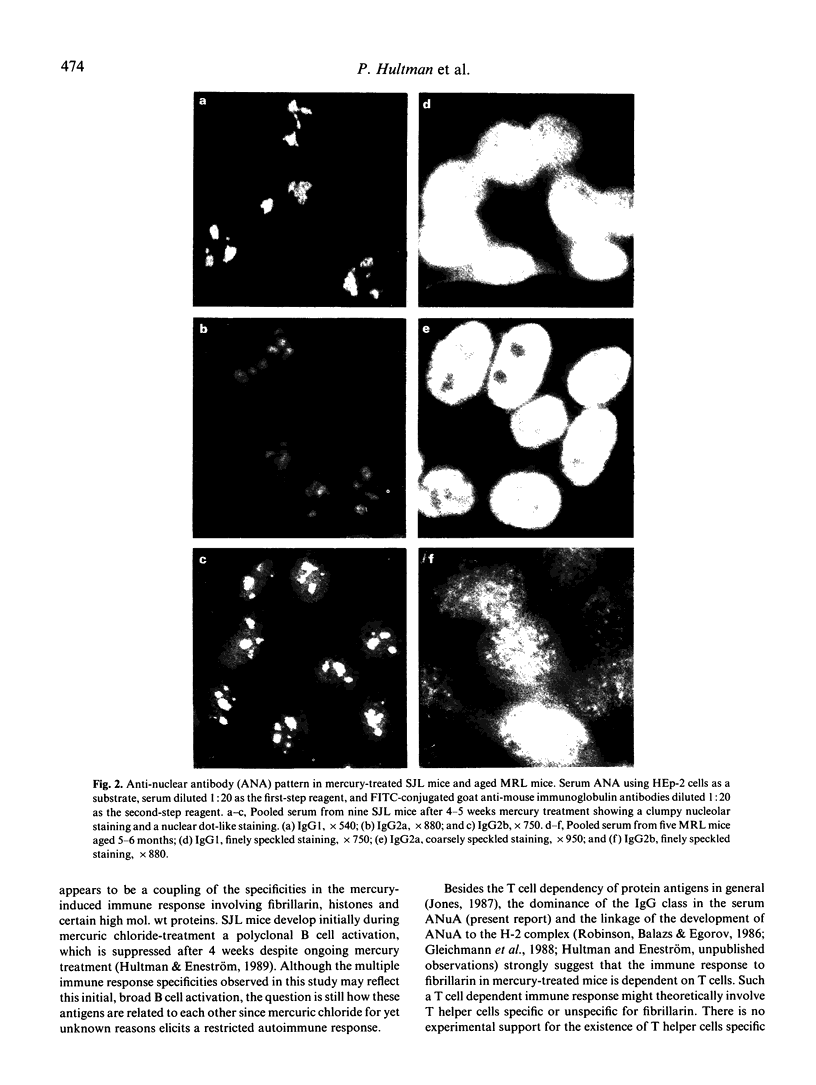
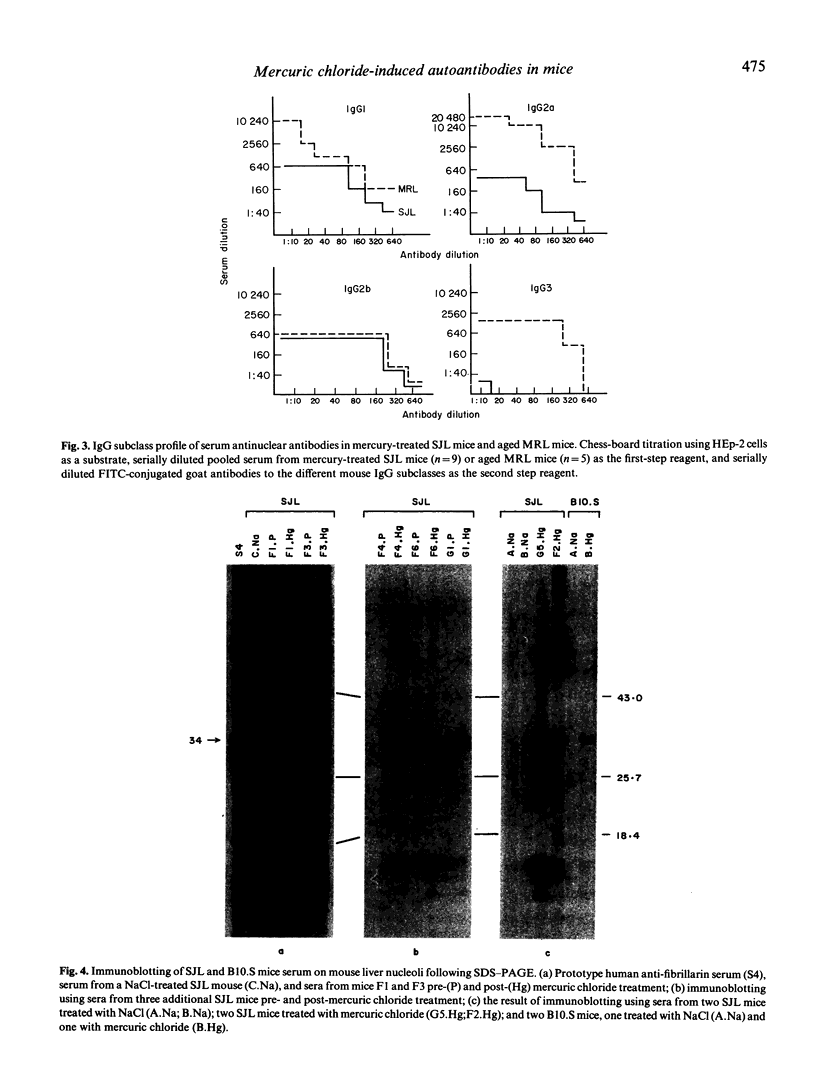
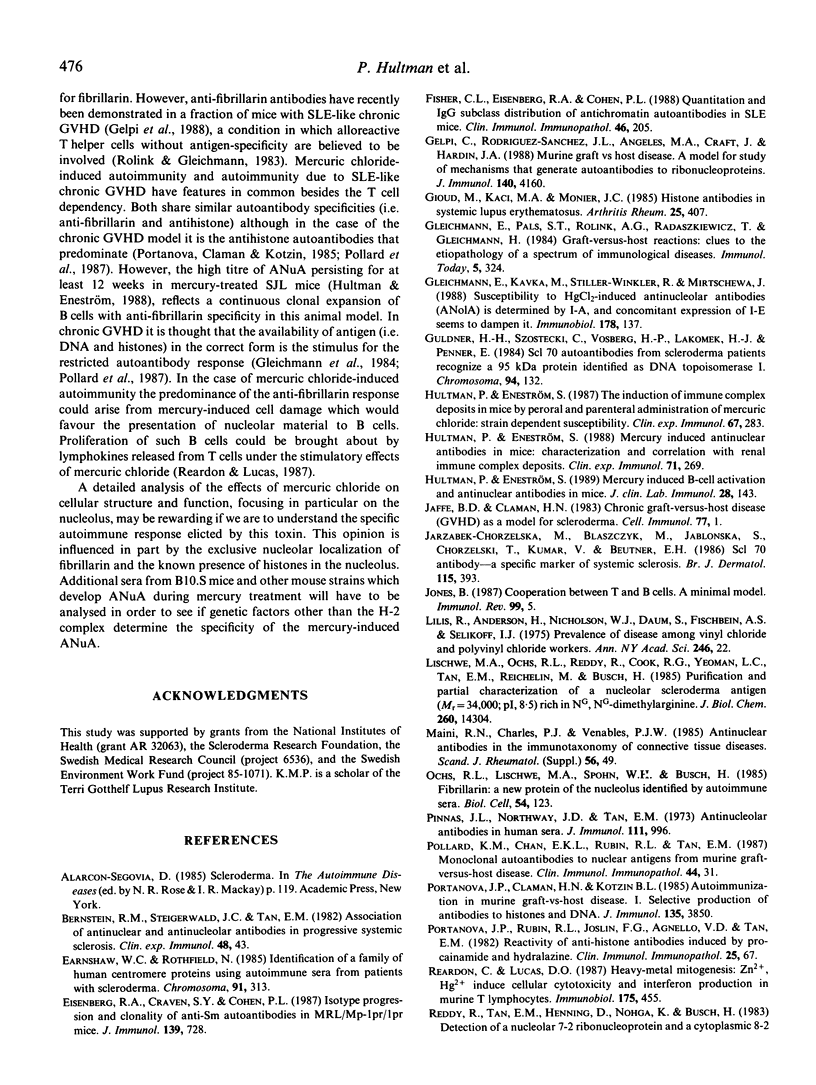
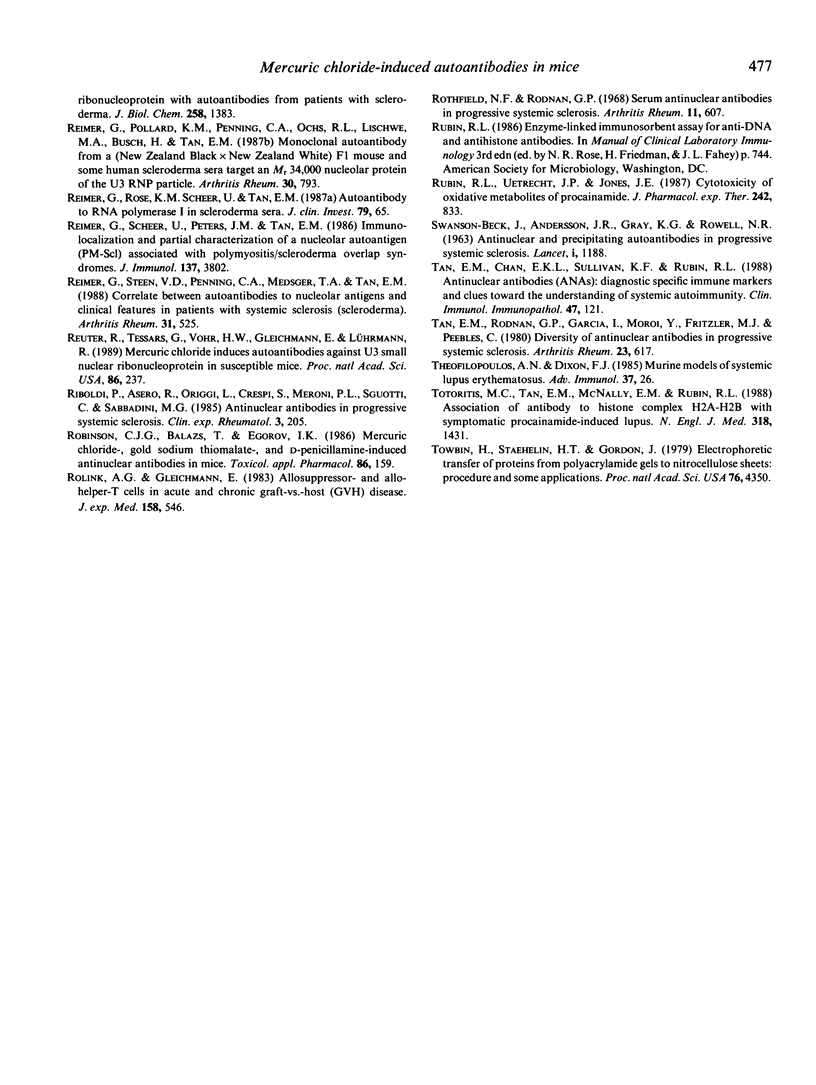
Images in this article
Selected References
These references are in PubMed. This may not be the complete list of references from this article.
- BECK J. S., ANDERSON J. R., GRAY K. G., ROWELL N. R. ANTINUCLEAR AND PRECIPITATING AUTOANTIBODIES IN PROGRESSIVE SYSTEMIC SCLEROSIS. Lancet. 1963 Dec 7;2(7319):1188–1190. [PubMed] [Google Scholar]
- Bernstein R. M., Steigerwald J. C., Tan E. M. Association of antinuclear and antinucleolar antibodies in progressive systemic sclerosis. Clin Exp Immunol. 1982 Apr;48(1):43–51. [PMC free article] [PubMed] [Google Scholar]
- Earnshaw W. C., Rothfield N. Identification of a family of human centromere proteins using autoimmune sera from patients with scleroderma. Chromosoma. 1985;91(3-4):313–321. doi: 10.1007/BF00328227. [DOI] [PubMed] [Google Scholar]
- Eisenberg R. A., Craven S. Y., Cohen P. L. Isotype progression and clonality of anti-Sm autoantibodies in MRL/Mp-lpr/lpr mice. J Immunol. 1987 Aug 1;139(3):728–733. [PubMed] [Google Scholar]
- Fisher C. L., Eisenberg R. A., Cohen P. L. Quantitation and IgG subclass distribution of antichromatin autoantibodies in SLE mice. Clin Immunol Immunopathol. 1988 Feb;46(2):205–213. doi: 10.1016/0090-1229(88)90183-3. [DOI] [PubMed] [Google Scholar]
- Gelpi C., Rodriguez-Sanchez J. L., Martinez M. A., Craft J., Hardin J. A. Murine graft vs host disease. A model for study of mechanisms that generate autoantibodies to ribonucleoproteins. J Immunol. 1988 Jun 15;140(12):4160–4166. [PubMed] [Google Scholar]
- Gioud M., Kaci M. A., Monier J. C. Histone antibodies in systemic lupus erythematosus. A possible diagnostic tool. Arthritis Rheum. 1982 Apr;25(4):407–413. doi: 10.1002/art.1780250408. [DOI] [PubMed] [Google Scholar]
- Guldner H. H., Szostecki C., Vosberg H. P., Lakomek H. J., Penner E., Bautz F. A. Scl 70 autoantibodies from scleroderma patients recognize a 95 kDa protein identified as DNA topoisomerase I. Chromosoma. 1986;94(2):132–138. doi: 10.1007/BF00286991. [DOI] [PubMed] [Google Scholar]
- Hultman P., Eneström S. Mercury induced B-cell activation and antinuclear antibodies in mice. J Clin Lab Immunol. 1989 Mar;28(3):143–150. [PubMed] [Google Scholar]
- Hultman P., Eneström S. Mercury induced antinuclear antibodies in mice: characterization and correlation with renal immune complex deposits. Clin Exp Immunol. 1988 Feb;71(2):269–274. [PMC free article] [PubMed] [Google Scholar]
- Hultman P., Eneström S. The induction of immune complex deposits in mice by peroral and parenteral administration of mercuric chloride: strain dependent susceptibility. Clin Exp Immunol. 1987 Feb;67(2):283–292. [PMC free article] [PubMed] [Google Scholar]
- Jaffee B. D., Claman H. N. Chronic graft-versus-host disease (GVHD) as a model for scleroderma. I. Description of model systems. Cell Immunol. 1983 Apr 1;77(1):1–12. doi: 10.1016/0008-8749(83)90001-1. [DOI] [PubMed] [Google Scholar]
- Jarzabek-Chorzelska M., Blaszczyk M., Jablonska S., Chorzelski T., Kumar V., Beutner E. H. Scl 70 antibody--a specific marker of systemic sclerosis. Br J Dermatol. 1986 Oct;115(4):393–401. doi: 10.1111/j.1365-2133.1986.tb06233.x. [DOI] [PubMed] [Google Scholar]
- Jones B. Cooperation between T and B cells. A minimal model. Immunol Rev. 1987 Oct;99:5–18. doi: 10.1111/j.1600-065x.1987.tb01169.x. [DOI] [PubMed] [Google Scholar]
- Lischwe M. A., Ochs R. L., Reddy R., Cook R. G., Yeoman L. C., Tan E. M., Reichlin M., Busch H. Purification and partial characterization of a nucleolar scleroderma antigen (Mr = 34,000; pI, 8.5) rich in NG,NG-dimethylarginine. J Biol Chem. 1985 Nov 15;260(26):14304–14310. [PubMed] [Google Scholar]
- Maini R. N., Charles P. J., Venables P. J. Antinuclear antibodies in the immunotaxonomy of connective tissue diseases. Scand J Rheumatol Suppl. 1985;56:49–57. doi: 10.3109/03009748509102061. [DOI] [PubMed] [Google Scholar]
- Ochs R. L., Lischwe M. A., Spohn W. H., Busch H. Fibrillarin: a new protein of the nucleolus identified by autoimmune sera. Biol Cell. 1985;54(2):123–133. doi: 10.1111/j.1768-322x.1985.tb00387.x. [DOI] [PubMed] [Google Scholar]
- Pinnas J. L., Northway J. D., Tan E. M. Antinucleolar antibodies in human sera. J Immunol. 1973 Oct;111(4):996–1004. [PubMed] [Google Scholar]
- Pollard K. M., Chan E. K., Rubin R. L., Tan E. M. Monoclonal autoantibodies to nuclear antigens from murine graft-versus-host disease. Clin Immunol Immunopathol. 1987 Jul;44(1):31–40. doi: 10.1016/0090-1229(87)90049-3. [DOI] [PubMed] [Google Scholar]
- Portanova J. P., Claman H. N., Kotzin B. L. Autoimmunization in murine graft-vs-host disease. I. Selective production of antibodies to histones and DNA. J Immunol. 1985 Dec;135(6):3850–3856. [PubMed] [Google Scholar]
- Portanova J. P., Rubin R. L., Joslin F. G., Agnello V. D., Tan E. M. Reactivity of anti-histone antibodies induced by procainamide and hydralazine. Clin Immunol Immunopathol. 1982 Oct;25(1):67–79. doi: 10.1016/0090-1229(82)90166-0. [DOI] [PubMed] [Google Scholar]
- Reardon C. L., Lucas D. O. Heavy-metal mitogenesis: Zn++ and Hg++ induce cellular cytotoxicity and interferon production in murine T lymphocytes. Immunobiology. 1987 Nov;175(5):455–469. doi: 10.1016/S0171-2985(87)80073-6. [DOI] [PubMed] [Google Scholar]
- Reddy R., Tan E. M., Henning D., Nohga K., Busch H. Detection of a nucleolar 7-2 ribonucleoprotein and a cytoplasmic 8-2 ribonucleoprotein with autoantibodies from patients with scleroderma. J Biol Chem. 1983 Feb 10;258(3):1383–1386. [PubMed] [Google Scholar]
- Reimer G., Pollard K. M., Penning C. A., Ochs R. L., Lischwe M. A., Busch H., Tan E. M. Monoclonal autoantibody from a (New Zealand black x New Zealand white)F1 mouse and some human scleroderma sera target an Mr 34,000 nucleolar protein of the U3 RNP particle. Arthritis Rheum. 1987 Jul;30(7):793–800. doi: 10.1002/art.1780300709. [DOI] [PubMed] [Google Scholar]
- Reimer G., Scheer U., Peters J. M., Tan E. M. Immunolocalization and partial characterization of a nucleolar autoantigen (PM-Scl) associated with polymyositis/scleroderma overlap syndromes. J Immunol. 1986 Dec 15;137(12):3802–3808. [PubMed] [Google Scholar]
- Reimer G., Steen V. D., Penning C. A., Medsger T. A., Jr, Tan E. M. Correlates between autoantibodies to nucleolar antigens and clinical features in patients with systemic sclerosis (scleroderma). Arthritis Rheum. 1988 Apr;31(4):525–532. doi: 10.1002/art.1780310409. [DOI] [PubMed] [Google Scholar]
- Reuter R., Tessars G., Vohr H. W., Gleichmann E., Lührmann R. Mercuric chloride induces autoantibodies against U3 small nuclear ribonucleoprotein in susceptible mice. Proc Natl Acad Sci U S A. 1989 Jan;86(1):237–241. doi: 10.1073/pnas.86.1.237. [DOI] [PMC free article] [PubMed] [Google Scholar]
- Riboldi P., Asero R., Origgi L., Crespi S., Meroni P. L., Sguotti C., Sabbadini M. G. Antinuclear antibodies in progressive systemic sclerosis. Clin Exp Rheumatol. 1985 Jul-Sep;3(3):205–211. [PubMed] [Google Scholar]
- Robinson C. J., Balazs T., Egorov I. K. Mercuric chloride-, gold sodium thiomalate-, and D-penicillamine-induced antinuclear antibodies in mice. Toxicol Appl Pharmacol. 1986 Nov;86(2):159–169. doi: 10.1016/0041-008x(86)90046-3. [DOI] [PubMed] [Google Scholar]
- Rolink A. G., Gleichmann E. Allosuppressor- and allohelper-T cells in acute and chronic graft-vs.-host (GVH) disease. III. Different Lyt subsets of donor T cells induce different pathological syndromes. J Exp Med. 1983 Aug 1;158(2):546–558. doi: 10.1084/jem.158.2.546. [DOI] [PMC free article] [PubMed] [Google Scholar]
- Rothfield N. F., Rodnan G. P. Serum antinuclear antibodies in progressive systemic sclerosis (scleroderma). Arthritis Rheum. 1968 Oct;11(5):607–617. doi: 10.1002/art.1780110502. [DOI] [PubMed] [Google Scholar]
- Rubin R. L., Uetrecht J. P., Jones J. E. Cytotoxicity of oxidative metabolites of procainamide. J Pharmacol Exp Ther. 1987 Sep;242(3):833–841. [PubMed] [Google Scholar]
- Tan E. M., Chan E. K., Sullivan K. F., Rubin R. L. Antinuclear antibodies (ANAs): diagnostically specific immune markers and clues toward the understanding of systemic autoimmunity. Clin Immunol Immunopathol. 1988 May;47(2):121–141. doi: 10.1016/0090-1229(88)90066-9. [DOI] [PubMed] [Google Scholar]
- Tan E. M., Rodnan G. P., Garcia I., Moroi Y., Fritzler M. J., Peebles C. Diversity of antinuclear antibodies in progressive systemic sclerosis. Anti-centromere antibody and its relationship to CREST syndrome. Arthritis Rheum. 1980 Jun;23(6):617–625. doi: 10.1002/art.1780230602. [DOI] [PubMed] [Google Scholar]
- Totoritis M. C., Tan E. M., McNally E. M., Rubin R. L. Association of antibody to histone complex H2A-H2B with symptomatic procainamide-induced lupus. N Engl J Med. 1988 Jun 2;318(22):1431–1436. doi: 10.1056/NEJM198806023182204. [DOI] [PubMed] [Google Scholar]
- Towbin H., Staehelin T., Gordon J. Electrophoretic transfer of proteins from polyacrylamide gels to nitrocellulose sheets: procedure and some applications. Proc Natl Acad Sci U S A. 1979 Sep;76(9):4350–4354. doi: 10.1073/pnas.76.9.4350. [DOI] [PMC free article] [PubMed] [Google Scholar]



